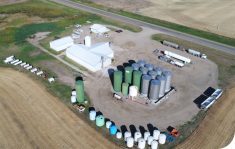Farmers concerned about petroleum wells and pipelines on their land will only get the attention of governments, regulators and energy companies by working together, say landowners who have formed groups.
A long line of landowners stood up at the Alberta Surface Rights Federation annual meeting Nov. 8 to describe problems with poor land reclamation, pipelines too close to their homes and contaminated water wells.
The problems were not new. Federation president Tony Nichols said he has heard the same issues brought up each year during federation meetings.
Read Also

Volunteers help exotic animal farm rebuild
Exotic animal farm loses beloved camel and pony to huge hail storm that gripped the Brooks, Alta. area as a community member starts a fundraiser to help the family recover from the financial and emotional damage.
Until property owners have trouble, they don’t know the questions to ask, he said.
“They’ve come after the fact to look for help,” said Nichols.
Nothing will change until neighbours begin working together before, during and after activity takes place, said David Core, president of the Canadian Alliance of Pipeline Landowners’ Associations.
“The only way you’re going to get change is to work with your neighbours the same way the pioneers did,” said Core, whose group was formed to help educate landowners of their rights.
While his association was formed to deal with problems with pipelines, the issues are similar for farmers at the surface rights meeting. The solution lies in working together to insist changes take place, he said.
Margaret Vance, president of the Ontario Pipeline Landowners’ Association, said her group was formed in 1993 by people concerned about the impact of three Enbridge-owned pipelines through their farms.
To force change they needed to raise $300,000 to take part in National Energy Board hearings about the pipeline. The group spent hundreds of hours knocking on their neighbours’ doors, raising money and preparing documents to present at the hearings.
“It was a Herculean effort,” said Vance.
Craig Storey of the Manitoba Pipeline Landowners Association said it formed seven years ago with similar concerns about the liability from abandoned pipelines and safety issues when crossing lines with heavy equipment.
“As individuals they’ll beat you into the ground. You don’t have the energy or the time or money unless you work together,” said Storey.
Ken Habermehl of the Saskatchewan Pipeline Landowners Association said the growing number of pipelines snaking through rural Saskatchewan has become a concern.
Before 2000, Habermehl didn’t know anything about pipelines, but he received a crash course when he bought land with existing pipelines.
Concerns about easements, safety matters and pipeline abandonment are growing with the increased number of lines crossing the Prairies.
Taking on multimillion-dollar pipeline companies isn’t for the faint of heart, or for a lone person, he said.
















